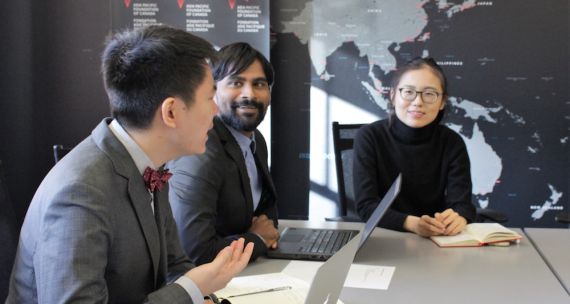Business leaders from across Canada and Asia met in Toronto on March 2nd for the third annual gathering of the Asia Business Leaders Advisory Council (ABLAC 2018). Formed in 2016, ABLAC provides a forum for open and candid dialogue on how Canada can realize the full potential of its business and economic engagement with Asia. One of the key objectives this year was to provide strategic policy advice informing the development of a long-term Asia Strategy for the Government of Canada.
For the first time, youth delegates attended ABLAC this year, adding a ‘millennial’ voice to the dialogue on how young Canadians can best prepare for the Asia Pacific Century. In particular, members of the Canada-China Young Professionals Network (CCYPN), a national non-profit network based in Ottawa, were in attendance.
Justin Kwan, Post-Graduate Research Fellow and Millennial Correspondent at ABLAC, sat down with three members from CCYPN: President and Co-founder Christine Martel-Fleming, Vice-President of Education Yany Siek, and Mentorship Co-ordinator Eric Bainbridge, to discuss how Canadian millennials can further engage with the Asia Pacific region.
Justin Kwan (JK): Thank you so much for joining me today. Would you mind telling our audience a little bit more about your organization, the Canada-China Young Professionals Network (CCYPN)?
Christine Martel-Fleming (CMF): CCYPN is a national non-profit network that encourages young Canadians to increase their awareness and understanding of Canada-China relations. Our current focus is on building students and young professionals’ China literacy to be able to take advantage of the ensuing economic and knowledge-sharing opportunities that China presents. We do this by hosting events, promoting scholarship and internship opportunities in China, and through our recently-launched mentorship program that provides one-on-one professional development and advice from a mentor with China experience. Our goal in the future is to provide a platform for both Canadians and Chinese students and young professionals to come together to discuss key issues of importance that affect the bilateral relationship directly (e.g. education, trade, diplomacy).
JK: ABLAC convenes business leaders from Canada and Asia to take part in transnational discussions to better engage both regions. Based on your observations, how do you think this year’s ABLAC meeting has moved the dial on the Canada-Asia agenda?
Yany Siek (YS): This year’s ABLAC meeting was salient because it identified key areas of opportunity for enhancing Canada’s engagement in the Asia Pacific. First, leaders highlighted areas of Canadian knowledge and experience that could help Asia to address emerging challenges. For example, Canada’s expertise in health care services and clean technology could assist the region in managing aging demographics and environmental sustainability issues.
Second, attendees emphasized the importance of the Canadian federal government and its provincial counterparts in advancing a cohesive and unified Canadian brand that draws upon the nation’s innovation, expertise, and diversity.
Finally, a dominant theme throughout the council meetings was the role Canadian youth can play in achieving a successful Asia strategy. Canadian and Asian millennials will drive Canada’s relationships with Asia, and investments must be made not only into cultivating interest, but also in developing the knowledge, language abilities, and cultural awareness necessary for engagement. By focusing on these three areas, Canada’s efforts to engage the Asia Pacific region will become more sustainable, comprehensive, and long-term.
JK: What do you think are the main ways that Canadian youth engage with the Asia Pacific region? And how can we help Canadian youth become more interested in Asia?
JK: For other students and young professionals who are looking to become more involved in issues related to Canada-Asia relations, what advice would you give them?
YS: There are many channels that students and young professionals can take advantage of to increase their knowledge and engagement in Canada-Asia relations. First off, we highly encourage Canadian youth to join organizations like CCYPN. These platforms are a great way to meet like-minded Canadians interested in Canada-Asia relations, build cultural understanding, and learn about different panel discussions and networking events to enhance your social and professional network.
For those who are interested in an immersive experience abroad, we recommend pursuing an academic exchange or internship in Asia. Experiential learning opportunities abroad help young Canadians to pursue their educational and professional aspirations while cultivating invaluable language abilities, knowledge, and cross-cultural understanding, which is necessary as Canada pivots towards Asia.
CMF: We understand that financial costs can be a barrier to study and work abroad. Thankfully, there are many financial resources out there to support Canadian youth in going to Asia. If you are interested in studying or working abroad in China specifically, Yany has developed a comprehensive list of awards, exchanges, research funding, and internships, which can be found on our website www.ccypn.org.
Given what you’ve learned throughout the day, what are some of the emerging skill sets that would be most advantageous for youth to be competitive in the global economy?
JK: Now that ABLAC 2018 has come to an end, what sort of events/projects can we expect to see from CCYPN in the near future?
Erik Bainbridge (EB): We are grateful to have attended ABLAC 2018 because it gave us an enhanced perspective of the opportunities and issues facing Canada-Asia relations and how best to develop programming and events that support Canadian youth in addressing these topics. For instance, the meetings covered the benefits of connecting youth entrepreneurs in Canada and Asia together to share knowledge and the need to support Canadian youth through incubators and accelerators that can help them launch products into Asian markets. This inspired CCYPN to create an event on innovation and artificial intelligence in China and the opportunities and implications for the Canadian economy, which took place in March 2018.
Furthermore, the meetings touched on the importance of diversity and inclusion of all Canadians in accessing employment opportunities and supply chains in Canada-Asia relations. These values are fundamental to CCYPN’s mission. It’s why we recently launched our mentorship program, which matches industry and academic mentors in Canada-China relations with mentees looking to develop their career. It is our hope that this program will address some of the barriers Canadians face in pursuing a China-related career and encourage a new generation of people to enter this field.
JK: Thank you, Christine, Yany and Erik, for your insights. We look forward to checking in with you again soon to learn more about your future projects and activities.
To learn more about the Canada-China Young Professionals Network, visit their website at http://ccypn.org, follow them on Facebook or on Twitter @CanadaChinaYPN







